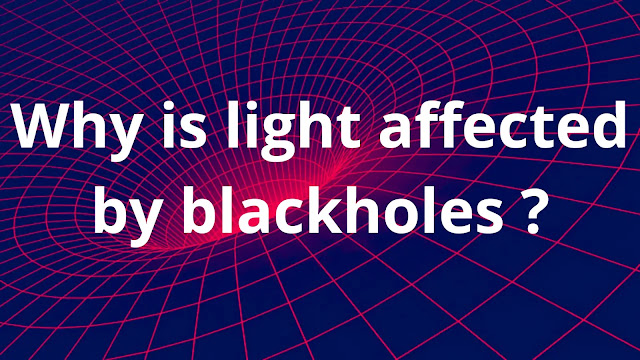Light indeed has no mass but it is still affected by black holes, this is simply because black holes can curve the space around them and light have to follow a path that is defined by the space (see: general relativity)
To put it more simply, it can be said that light has no mass but energy, so it will be affected by gravity, because gravity can also affect anything which has energy
Let’s try to understand this with the help of an example:
· Consider a string with a bead on it
· This bead can only slip along the string, In other words, the path of motion of the bead is guided by the string
· If we keep the string straight the bead will also slide in along that straight path, and no other path
Keeping this example in mind, now replace this string with space and bead with light
Light will have to travel where there is space and the path of light is also guided by this space
What if this space bends at some point?
If space bends, light will HAVE TO change its path, and bend along the curved space
Generally:
If anything has the energy or mass (both are basically the same because of mass-energy equivalence), it will be affected by how space in which they travel behaves
There certainly is not a force that is pushing light to go along the curved path, but light only and only have one choice, which is to go along the path directed by the space
Curving of space is the exact same thing that happens near a black hole (see: what Oxford dictionary won't tell you about blackholes)
Technically speaking a black hole is a point in space where the curvature of space tends to infinity
To visualize this, it can be thought of as a neverending hole
What this means for light?
For a light wave, this means that light will also have to curve infinitely, meaning it will have to enter this never-ending hole
And when light enters this place it will surely never return back, because the space inside guides it to infinity
This is why it is popularly said that black holes are the regions in space-time from where even light cannot escape
Another interesting fact:
Light has no mass but has momentum, so when the direction of propagation of light changes the momentum also changes (as momentum depends on direction)
To change momentum, something needs to absorb or release the energy in some form
But how light changes its energy?
Light cannot change its kinetic energy to account for this change of momentum
To account for the change in momentum, the wavelength (or frequency of light) changes
What this means
This means that if light bends due to gravity its color will change
Conclusion-
blackholes affect light despite it being massless is because light will have to follow the curved space path around a black hole, as it has no other choice, in this process light also changes its color.


Comments
Post a Comment